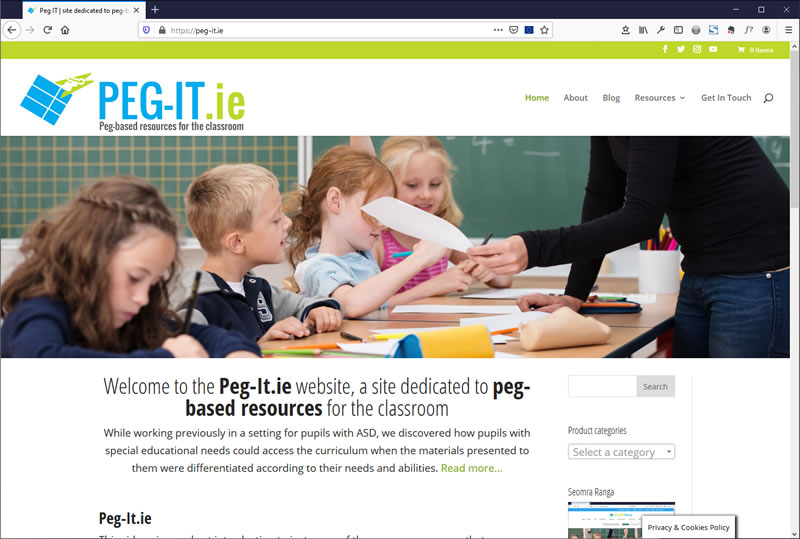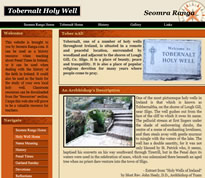 I just came across this blog, Autistic and Proud, in the past few months and have been eagerly reading all the articles since. In my opinion, the blog is unique in that it is written by Fionn Hamill, a twelve year old boy with Aspergers (“aspies” as he regularly refers to himself in a mildly irreverent way!) and his mother Helen. They write about life for someone on the autistic spectrum from the point of view of the child and the parent. Helen says that the blog title was Fionn’s idea and that it gives him the “opportunity to help the world understand how it looks through his eyes”.
I just came across this blog, Autistic and Proud, in the past few months and have been eagerly reading all the articles since. In my opinion, the blog is unique in that it is written by Fionn Hamill, a twelve year old boy with Aspergers (“aspies” as he regularly refers to himself in a mildly irreverent way!) and his mother Helen. They write about life for someone on the autistic spectrum from the point of view of the child and the parent. Helen says that the blog title was Fionn’s idea and that it gives him the “opportunity to help the world understand how it looks through his eyes”.
Helen and Fionn have kindly given Seomra Ranga permission to re-publish material that was first published on Autistic and Proud. Here, they give advice for teachers on what school life is like for a pupil with autism and how schools can help to make school life easier for them. It is a great insight for classroom teachers who may have an ASD pupil in their classroom.
Helen:
We realised at the end of Primary One, that Fionn had Asperger’s. We were moving into a new class, where the teacher had had previous experience on Asperger’s as had the newly assigned full time Classroom Assistant. But my thoughts on Autism and the courses being run by education services, was that these courses were general information … starting with the “What is Autism?”. This is still not specific to my child – to what his fascinations are, what he reacts like when he is nervous, what way he needed to be explained to if he was confused, basically more a “What is Fionn’s Autism?”
So we decided to give the class specific information. We gave it to save the best teacher time trying to translate Fionn, and to push the weaker teacher to look at what was actually in front of her…it also could be handed over to a sub-teacher, and was basically a get to know “how he presents” list…
This was an early type of example…from when he was about 9:
Fionn P5, has normal intelligence. He has Asperger’s syndrome. He has ADHD as part of his condition- we are not keen to medicate and are working with OT on strategies. He has arthritis/rheumatic flare ups in both knees.
In classroom:
- Fionn is always well intentioned- never deliberately disruptive
- He is incredibly restless and fidgety – has some fidget toys or can squeeze blu tak
- He “mouths” objects – OT has suggested strategies
- The more stressed he is, the more he needs to work off steam – ball etc or OT strategies
- Sits on one leg when he sits – and rocks on chair
- Can get up and wander around the room – and needs to
- Has a very short attention span
- Finds homework and written work difficult to stick at – very little interest in presentation
- Won’t make it obvious when he is stressed or confused
- Can shout out in class – unaware that he is being disruptive
- Is very visually stimulated – finds it easy to become distracted
- Has a very impressive rote memory – but this is an artificial intelligence
- Speaks articulately but not always understanding content
- Will need tasks to be set appropriately to his attention – and maybe cut down quantity
- Disciplining Fionn should only be when he fully understands the significance of what he has done
- Has very poor postural stability when writing and tires quickly
- Enjoys ICT and is quite capable
- Very disorganised – school bag, books, can be lost easily
Fionn:
Teachers sometimes have a habit of not understanding Aspergers. A few are……..
- Not letting us sit on our knees, that is a comfortable position.
- Not letting us walk around in class, we must always be active.
- Not letting us fidget with our hands.
- A lot of us like to doodle or draw squiggly lines, teachers don’t like that.
- Keep an eye that we understand
- Sometimes our faces and bodies give clues that we might be a bit annoyed or don’t understand – like my twitchy mouth.
- We constantly like sharpening our pencils, well, I do, but teachers don’t approve.
- We ask a lot of questions to make things easier but teachers tell us to put our hands down.
- We feel the need to talk when we are bored, and we never learn our lesson so they have to keep telling us, we don’t mean it.
- We should have fidget toys to keep us relaxed, eg: blue tack.
- We need as much learning support as we can get, like printouts and stuff on USB stick etc.
- We should all get extra time for an exam, for sometimes we work a bit slower than the rest. (I get extra time but other people might not.)
- That we think outside the box and they should respect our opinion.
- To phrase everything as it is and make it easy to understand.
- Never use idioms or sarcasm
- We speak sometimes before we put our hand up – it isn’t deliberate, it’s a thing about understanding. As soon as you speak, you remember the hand should be up
- In a double class when we have to concentrate for a long time, allow us a wee break to move – even to go to the toilet.
- Organisation is a huge problem not a choice. I can’t help that my schoolbag is a tip. I don’t mean it to be.
- My handwriting is bad, and I doodle, but I can’t help it. My pencil grip is very tight cos of my hypermobile joints.
- Things like drawing margins and keeping your book beautiful is never going to happen easily for me.
- I prefer to write in pencil, and am thinking others do, cos we make more mistakes. So it makes rubbing out easier.
- My uniform might not be tidy as I don’t like the feeling of the collar on my neck or the tie too tight.
- Make sure your face matches what you are trying to say – it can be hard to read.
- A revision list at the end of each chapter. Sometimes like geography it is hard to know what exactly we learn.
- It is hard for Aspies to skip from topic to topic so teachers should try not to skip out chunks of pages
These are a few things that would make school easier.
Helen:
I thought since Fionn had explained how smooooothly his transition to secondary school went, I should share the things we did to help it be as comfortable as possible.
- We had lots of specialist reports attached to Fionn’s SEN statement. They are only advisory appendices UNLESS you specifically ask for the inclusion of as much of the helpful material as possible to be added. If you do not feel your child’s needs are being met in school, you can only really insist the content of Section 2 of the Statement – the needs, are addressed. This means that Section 3 of the statement mentions specifically the strategies the schools need to carry out! THIS IS VITAL!
- We called a Multi-disciplinary group meeting. We asked the receiving school to facilitate. We gave the invite list to Paediatrician, CAMHs, OT, Educational Psychologist (both old one and new beginning one). ASAS (both old one and the new one), His Primary School Principal, his Primary Classroom Assistant (who had been 5 years with him) and the Educational Needs Officer from ELB. The meeting was BRILLIANT. it was essentially round-table talk. Everyone got to give their version of what would be necessary. This allowed the school to take detailed notes on how he presented, on the subtleties of his condition, and how it was appropriate or inappropriate for them to deal with each issue.
- The SENDist from School and SMT met with me, and went over their suggested strategies and I was allowed input.
- Fionn and I went up to the school and met with SENDist and Form Teacher, and he was able to help me give as clear and specific a description of how he is, how he sits, how his work will be presented…
- The school then arranged a meeting for Fionn and SENDist and the new Classroom Assistant and myself – so that again they got to learn a bit more about him. : how he shows signs of stress, signs of anxiety, how he finds some sensory issues difficult, his sense of justice…lots of insight.
- At this stage we were asking Fionn to mark his anxiety and excitement levels as percentages. Each time we had a meeting they shifted…if he got to ask about the what ifs of bigger boys, the what ifs of doing music, the what ifs of sitting his way…the balance shifted!
I have to say, so far the school have, initially followed our requests with meetings etc, but have taken on board all that we asked.
- We get a second copy of homework – written by assistant.
- We get a report from the assistant daily on his form, when he was unsettled, confused.
- The school SENDist meets his assistant weekly and any issues are raised.
- He is beginning to build a relationship with his new assistant
- We were able to broach issues for instance that in languages, he spelt words as they would sound in English….we now get copies of all PPT slides printed with new vocabulary on it.
- We decided to continue to build his independence by allowing him to try to manage on corridors etc unaided. That’s working out .
- And best of all from day one….he walks home….with 2 old friends – one from his class and one at the adjacent school. Over a few days the group had increased and there were new boys and a few football team-mates from yet another school.
- Fionn’s strongest subject is his PERSONALITY.
- His new school has done nothing to daunt that…and as he says himself….he is 100% happy
We made the right choice!
Fionn:
School and its difficulties and advantages for aspies
This year I started secondary school. It’s a big jump since primary cos u don’t have just the one teacher, you have loads. Some of the teachers are better understanding me that others. Mum had lots of meetings with the school and gave them loads of information like I like to sit on my legs, sometimes sit with my knee up, that I’m fidgety etc. here are my subjects:
- French – at first spelling was really hard so now I get notes on my USB and I get handouts from the teacher of new vocabulary so that makes it easier.
- Irish – again from Irish I get handouts and USB work, but I sometimes get the oral pronunciation from the teacher recorded onto my USB which really helps.
- Music – I love music and there is NO disadvantages and nothing extra needed.
- Maths – I don’t get handouts in maths and sometimes the teacher tells us stuff in a way that gets me confused. Also maths is challenging because its a new topic every week, so there isn’t much time spent on each one and checking understanding. Mum has to help teach me in a way I get it at home.
- English – English is dead easy cos I love to read and write stories.
- Geography – I had a really good and funny sub teacher while my real teacher was on maternity leave, and he understood me really well , though the REAL teacher didn’t understand me as well. It would be handy if I got a handout from geography.
- Science – I really like science cos in primary school we NEVER did it. So it was new. It’s hard cos we skip from topic to topic VERY quick which gets me confused cos I don’t know if I’ve done it or not. My teacher has recently started giving handouts which is handy.
- Religion – I really like the teacher and she likes me though at the start she was quite angry. She gives me lots of merits and lets me read a lot.
- History – I have a really funny teacher who understands me really well and he likes the fact that I ask questions that are a bit different. History is interesting cos it teaches you stuff about the presents. Revision lists would come in handy.
- I.C.T. – I’m really good on computers and I find most things a walk in the park.
- P.E. – I’m really sporty so I love P.E. I only got into sport cos mum and dad thought It was a good thing for aspies to do. I love keeper cos I hate contact. When I start a new sport I make an excuse not to do it and just watch and decide would I like it.
- P.D. – I introduced my autism to my class in this subject so they would get me.
- Lunch – I have a lunch pass which makes me popular at lunch. its for me and i choose 2 friends.
- Choir – I was nervous the first day but was fine after. mam made me go and she was right.
- Library – I do my homework in here sometimes and I obviously read here.
I LOVE SCHOOL!!!!
Many thanks to Helen and Fionn for permission to re-publish material from their blog. The image is © of Helen and Fionn Hamill. You can read lots more about life with Aspergers on their blog Autistic and Proud. You can also follow Helen on Twitter @helenhamill
Fionn wrote about this Guest Post on his blog: I Was Asked to Write a Blog For Teachers






thankyou
Fionn set up his Blog (which i help keep safe) to help people understand aspergers from his perspective.
I taught for 20 yrs and realised that the only real experts on Asperger’s are the people who live with it…
experts by experience 🙂
NOT proclaimed experts on autism, but experts on Fionn’s autism.
Helen
I have been reading Fionn’s blog for quite a while and love the dialogue !
Have a look at our website – we specialise in helping adults on the ASD spectrum and similarly challenged to gain employment, We started last December and are now educating employers on the abilities that Aspies have and the competitive advantages that can be gained. Google the words SAP and Specialisterne – the results should make facinating reading for you
Regards,
Frank Holt
Specialisterne Ireland
Excellent reading I am a special needs teacher myself